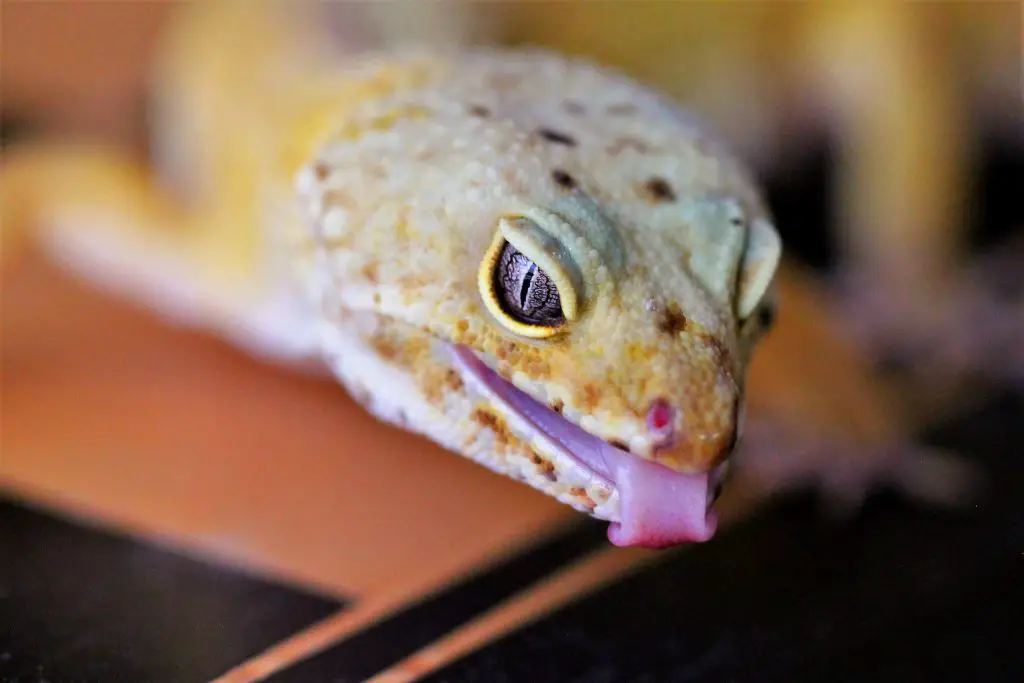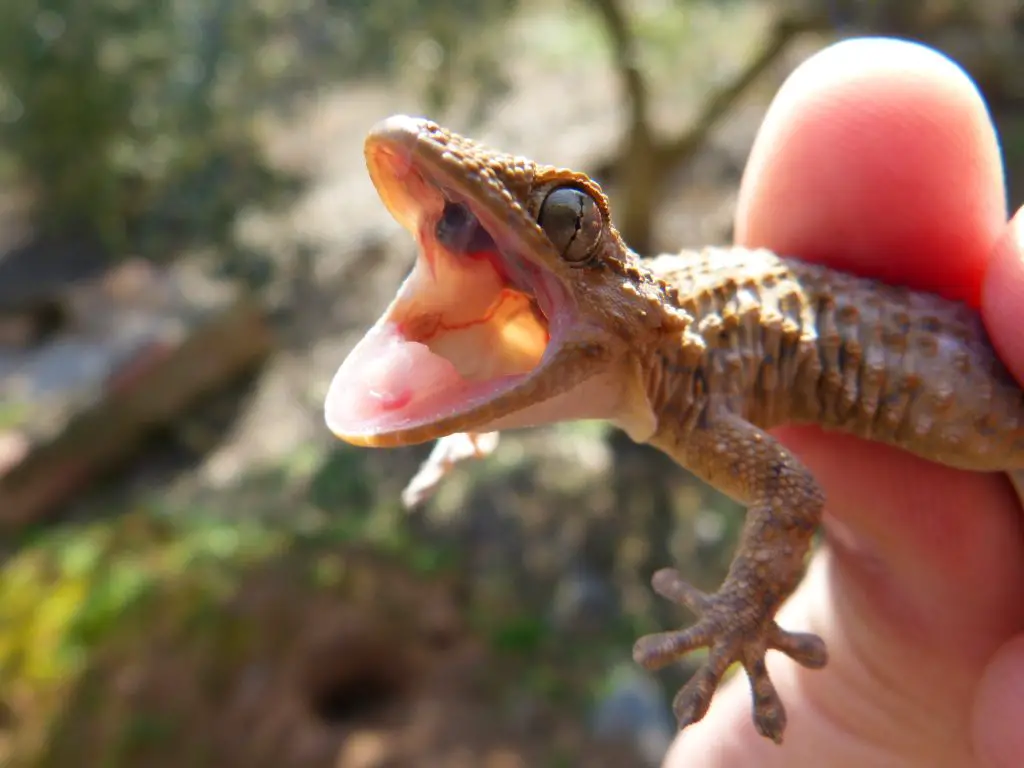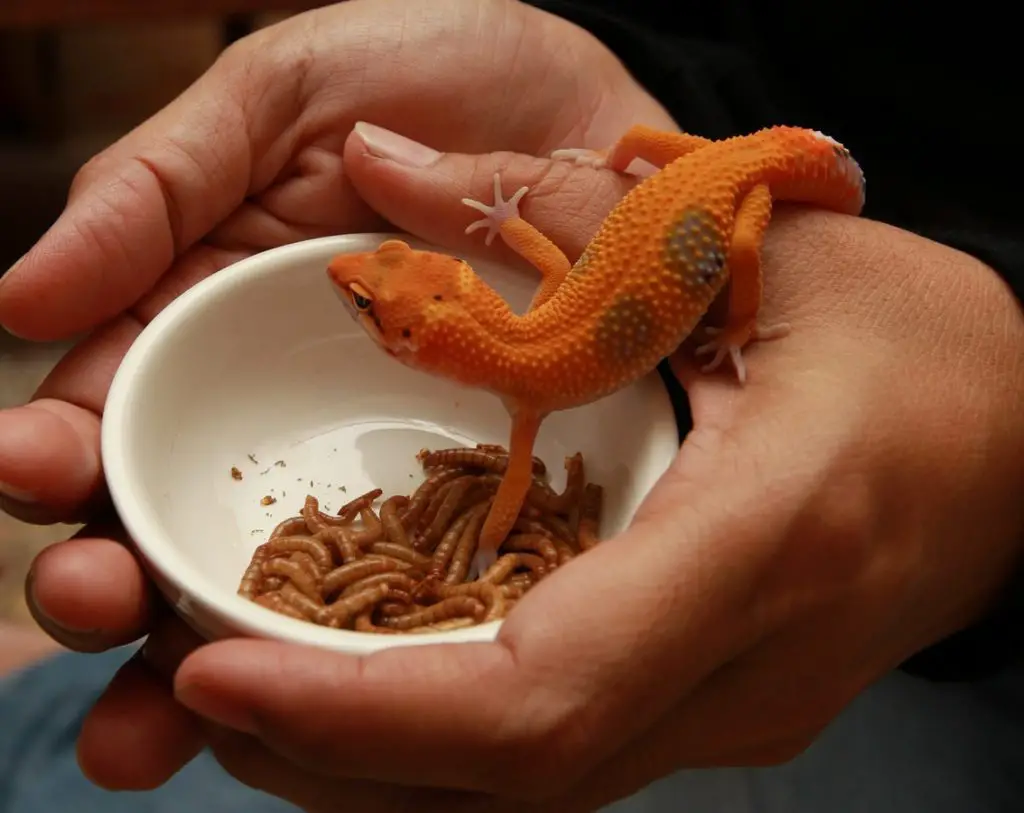Leopard geckos are one of the most popular pet lizards. They are easy to care for and come in a variety of colors. But did you know that leopard geckos can throw up? That’s right, these little guys have a vomiting reflex that helps them get rid of unwanted items in their stomachs.
In this article, we will discuss the reasons why leopard geckos throw up and how you can help prevent it from happening.
Key Takeaway
- Leopard Geckos may regurgitate or throw up due to various reasons such as stress, overfeeding, low tank temperatures, sudden handling, feeding with large or spoiled food items, and underlying health issues like gastroenteritis or internal parasites.
- Leopard Geckos swallow their food, typically insects, by using their teeth to handle the prey and their neck muscles to aid in swallowing, often displaying a head sway for larger items.
Why Do Leopard Geckos Throw Up

Leopard Geckos throw up when they are eating too much too fast, they ate something that doesn’t agree with their stomachs, or they are trying to get rid of any parasites in their system.
You can prevent your Gecko from throwing up by feeding them smaller meals more often instead of one large meal.
This will help them digest their food better and not overwork their system. You can also try feeding them live insects that are easy to digest, such as crickets or mealworms.
Another reason why Leopard Geckos throw up is that they ate something that doesn’t agree with their stomachs such as a piece of rock or a substrate from their tanks. Depending on the amount and size, it might either pass through their digestive system or they will throw it up.
Even the best-cared-for leopard gecko can get sick. One common illness in leopard geckos is parasitism. They usually get this illness from infected prey items like crickets or mealworms. Keep in mind that the Leopard Gecko won’t be able to throw up the parasites themselves and will require proper treatment.
If your leopard gecko throws up once in a while, it’s probably nothing to worry about, but if it becomes a regular occurrence, you should take your Gecko to the vet.
In the meanwhile to prevent your Leopard Gecko from getting parasites is to make sure it has a clean and spacious habitat. Feed them fresh food and water and avoid contact with other animals that may be infected with parasites.
How Do Leopard Geckos Swallow?

Leopard geckos are able to swallow their food whole because of their long, narrow tongues. The tongue is attached to the back of the throat and extends all the way down to the stomach. When a leopard gecko eats, its tongue darts out and grasps the prey. The tongue then quickly retracts, drawing the food into the mouth and down the throat.
While this method of swallowing may seem simple, it’s actually quite amazing! Researchers believe that leopard geckos have evolved this ability in order to survive in their arid habitat. By being able to swallow their food whole, they can avoid losing moisture through their skin while eating.
Leopard geckos have a very long and thin tongue that they use to catch prey. The tongue is sticky and can be extended up to twice the length of the gecko’s head. When the tongue touches something, it sticks to it and the gecko can then pull its prey into its mouth.
Leopard Geckos have very interesting mouthparts that allow them to eat a variety of food items. Their mouths are lined with sharp, curved teeth that help them to tear their food. They also have a long tongue that they use to lap up water and other liquids.
Leopard Geckos are able to move their tongues in and out very rapidly, which helps them to catch their prey. Their mouths are also very flexible, which allows them to eat a wide range of food items. Overall, Leopard Geckos have a very efficient way of eating that helps them to thrive in the wild says Terrarium Quest.
Do Leopard Geckos Regurgitate?

Leopard geckos will often regurgitate their food if they don’t eat it all immediately. This is usually done as a way to store food for later, but it can also be a sign that the lizard is sick or stressed. If you notice your leopard gecko regurgitating more than usual, you should consult with a veterinarian.
Regurgitation is the process of expelling material from the stomach through the mouth. In the wild, Leopard Geckos use this process as self-defense. When a predator threatens a Leopard Gecko, the Gecko will contract its muscles and expel the contents of its stomach through its mouth.
This includes not only food but also any other objects that may be in the stomach, such as stones or shells. The sudden loss of weight makes it easier for the Gecko to escape its attacker. Regurgitation is a voluntary process that lizards can control, so they will not do it unless they are in danger.
Once the Leopard Gecko has regurgitated its stomach contents, it will need to replenish them. It will do this by eating more food or, in some cases, by licking the discharged material back into its mouth and swallowing it again.
This may seem like gross behavior to us, but it is an important part of a lizard’s survival strategy. By being able to get rid of its stomach contents when necessary, a lizard can avoid being eaten by predators.
Why Did My Leopard Gecko Throw Up Mealworms?
There are a few reasons why leopard geckos may vomit their mealworms. One possibility is that the worms are too big for the gecko to digest properly. Another reason could be that the worms have died in the gecko’s stomach, leading to an upset stomach. Finally, some leopard geckos simply don’t like eating mealworms and will vomit them up as a way of rejecting them.
Leopard geckos are carnivorous lizards that like to eat insects, such as mealworms. In the wild, they typically eat crickets, cockroaches, and other small insects. Mealworms make a good food choice for captive leopard geckos because they are easy to find and offer a variety of nutrients.
When choosing mealworms, be sure to select live ones that are active and healthy. Avoid mealworms that are sluggish or have black spots on their bodies, as these could be indicative of disease.
When feeding mealworms to your leopard gecko, offer a few at a time and remove any uneaten worms after a few minutes. This will help to ensure that your gecko does not overeat and become obese.
Can Leopard Geckos Get Carsick?
Leopard geckos can get carsick just like people can. When a leopard gecko is in a moving vehicle, it may feel motion sickness. This can cause the leopard gecko to act strange, such as being inactive or not wanting to eat.
If your leopard gecko seems to be getting carsick, try to keep it as still as possible and give it some water or food to help settle its stomach.
Leopard geckos are ground-dwelling lizards that are found in the deserts of Asia and Africa. They are nocturnal animals, meaning they are most active at night. During the day, they like to hide in burrows or under rocks to stay cool and avoid predators.
Leopard geckos don’t like driving in a car because it’s not their natural habitat. When they’re in a car, they can’t hide from predators or escape the heat.
They also can’t find food or water, which can lead to dehydration and starvation. If you must take your leopard gecko on a road trip, make sure to stop frequently so they can stretch their legs and drink some water.
FAQs
Q: What are the signs of a leopard gecko throwing up?
A: Some signs that a leopard gecko may be throwing up include regurgitation of food, weight loss, lack of appetite, and overall lethargy.
Q: How can stress cause leopard geckos to throw up?
A: Leopard geckos are sensitive creatures and can easily become stressed. Stressors such as improper handling, sudden changes in their environment, or the presence of other aggressive animals can lead to vomiting.
Q: What should I do if my leopard gecko throws up?
A: If your leopard gecko throws up, it’s important to assess their overall health and environment. Make sure they are in the proper temperature, have a balanced diet, and are not being stressed. If the vomiting continues, consult a veterinarian.
Q: Can an improper diet cause a leopard gecko to throw up?
A: Yes, an improper diet can lead to vomiting in leopard geckos. Feeding them food that is too large, not providing enough calcium or vitamins, or feeding them live prey that is too large can all contribute to digestive issues.
Q: Are there any specific foods that leopard geckos are more likely to throw up?
A: Feeding leopard geckos food that is too big or difficult to digest, such as large crickets or mealworms, can increase the chances of them throwing up.
Q: Can a leopard gecko’s habitat or living conditions cause them to throw up?
A: Yes, improper temperature, lack of hiding spots, dirty environment, or a crowded enclosure can all contribute to stress and potentially lead to vomiting in leopard geckos.
Q: How can I prevent my leopard gecko from throwing up?
A: To prevent your leopard gecko from throwing up, provide them with suitable habitat, proper temperature gradients, a balanced diet of appropriately sized prey, and minimize stressors in their environment.
Q: When should I seek veterinary help if my leopard gecko is throwing up?
A: If your leopard gecko continues to throw up despite making necessary adjustments to their environment and diet, it’s advisable to seek veterinary help. A veterinarian can help determine the underlying cause and provide appropriate treatment.
Q: Are there any specific medical conditions that can cause leopard geckos to throw up?
A: Yes, there are several medical conditions that can cause leopard geckos to throw up, such as gastrointestinal infections, parasites, and impaction. A veterinarian will be able to diagnose and treat these conditions.
Conclusion and final thoughts
Leopard geckos are a unique species of reptiles that have evolved over time to become the incredible creatures we know today.
They face many potential health issues, one of which is regurgitation or “throwing up”.
This blog post explored why leopard geckos may throw up and provided insight into what could be causing it.




